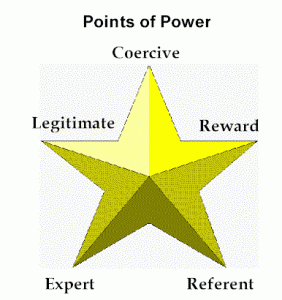 In 1959 two social psychologists John French and Bertram Raven identified 5 ways that individuals may gain or exercise the power of ‘leaders’. These 5 ways were identified as; Legitimate, Reward, Expert, Referent, Coercive. If we understand these, first it helps us understand why one person can influence another, see where your own power as a leader may be coming from and see the areas that may make us a better leader. While this month’s word is Leadership, the main reason I am writing about this is that as parents we are leaders and we have power – but how we got that power and how we use it determines if we are being the best kind of leader for our children. Our example teaches them how to be leaders too.
In 1959 two social psychologists John French and Bertram Raven identified 5 ways that individuals may gain or exercise the power of ‘leaders’. These 5 ways were identified as; Legitimate, Reward, Expert, Referent, Coercive. If we understand these, first it helps us understand why one person can influence another, see where your own power as a leader may be coming from and see the areas that may make us a better leader. While this month’s word is Leadership, the main reason I am writing about this is that as parents we are leaders and we have power – but how we got that power and how we use it determines if we are being the best kind of leader for our children. Our example teaches them how to be leaders too.
Legitimate Power comes from our title or position that we hold. While we will never lose that position with our children like other positions might be lost ( a boss, the mayor, CEO) our power is limited to situations and the time that our children believe that we have the right to exercise that control. Obviously if our leadership is only based, “Do this because I’m the parent!” our influence will be short term. However, there are times that we must use our position of parent to make and enforce decisions that may not be popular.
Reward Power comes from our ability to give out rewards. In the business world, there may be a person who is seen as a leader because they hold the power to give a promotion or raise and therefore have a kind of control over others. From the parent point of view if our control of our children is based simply on the reward they will get if they behave in a certain manner, when the rewards do not hold enough value to the child or we are not able to make the reward large enough – the power and perceived leadership is weakened. In the decision of making rewards, physical or material rewards may not be what would be best for the child, and will most certainly create a materialistic monster that we cannot continue to feed.
 Coercive Power using threats, denying privileges, punishments and the like are the most common methods of coercive power. We see it in the business world and we see it in parenting. We may have the position to use this, but if this is our main source of power, the power comes from a place of fear and not love and respect. Again this is not to say that we should not punish. But the punishment should be natural consequences for the behavior – not just some arbitrary punishment based on how we are feeling that day. Coercive power can very easily become or be bullying, both in the family and in the business world
Coercive Power using threats, denying privileges, punishments and the like are the most common methods of coercive power. We see it in the business world and we see it in parenting. We may have the position to use this, but if this is our main source of power, the power comes from a place of fear and not love and respect. Again this is not to say that we should not punish. But the punishment should be natural consequences for the behavior – not just some arbitrary punishment based on how we are feeling that day. Coercive power can very easily become or be bullying, both in the family and in the business world

Expert Power generally comes from knowledge and skills that enable us to use solid judgment and have a better understanding of a situation. This is pretty easy to do with a child, but as they get older expanding your knowledge and being willing to learn from others is part of building your reputation with your children. By demonstrating or modeling your expertise in the character, values, morals and ethics that you would like to see in your children – you are leading them by example as well as the words of wisdom that you speak. This does not require position or coercion to improve your leadership skills.
Referent power is about liking another person, charisma, respect and admiration. Not all of us have this in the business world and relying solely on this base of power is not a good strategy, it comes pretty naturally with our children. Our children love and adore usand if we learn to lead in a balanced way, set a great example and lead with love and fairness we will maintain that referent power. However we can lose this respect and admiration easily by the overuse or abuse of the other bases of power.
Just as an exercise, look at each of these power bases and see how you have used them in your parenting style and if it has served you well. Think about your own experiences both in the business world and with your own parents and how did their styles affect you.






 Our conversation this month on Leadership started with asking the students, What is a leader? There were many comments, but all ended that the person had to be honest and “nice” to others. Obviously a leader has to be someone that others want to follow, but why? Why are people willing to follow another person? People are willing to follow others if the leader has a vision or a goal and then is able to make good choices and set a great example.
Our conversation this month on Leadership started with asking the students, What is a leader? There were many comments, but all ended that the person had to be honest and “nice” to others. Obviously a leader has to be someone that others want to follow, but why? Why are people willing to follow another person? People are willing to follow others if the leader has a vision or a goal and then is able to make good choices and set a great example. Each month we will discuss a life skill with all of our students. This month the word is Leadership. This word will be defined in the following ways for our students.
Each month we will discuss a life skill with all of our students. This month the word is Leadership. This word will be defined in the following ways for our students.